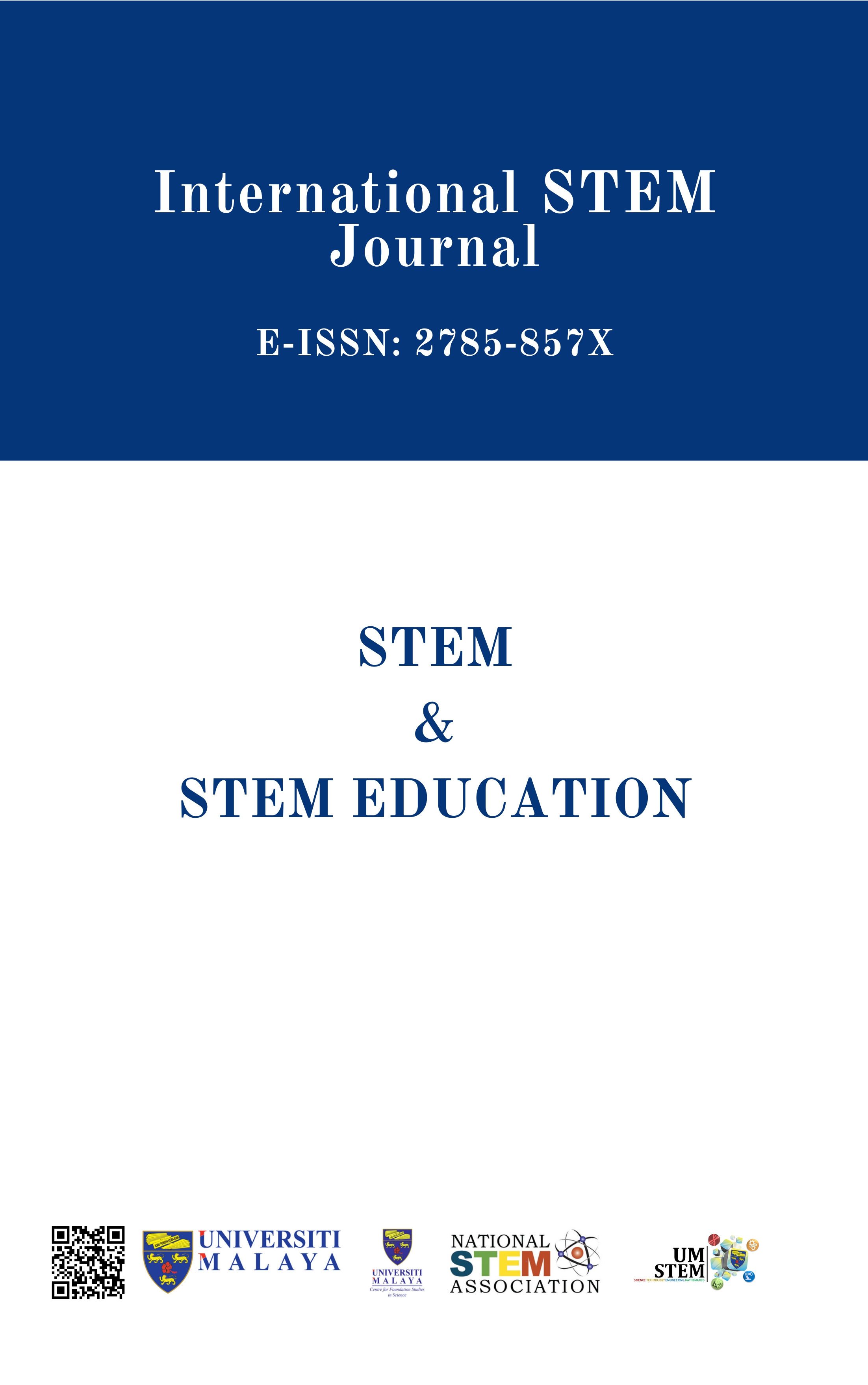STEM Edutourism Exploring Impacts on Knowledge, Attitudes, and Motivation via the Malaysia-Singapore Science Field Trip
Keywords:
Edutourism, STEM Engagement, Field Trip, STEM Knowledge, STEM Attitudes, STEM MotivationAbstract
This study investigates the impact of a four-day Malaysia-Singapore science field trip on enhancing STEM engagement among educators, students, and stakeholders. Using a mixed-methods approach, data was collected via structured surveys with quantitative Likert-scale items and qualitative open-ended questions. Quantitative data was analyzed with SPSS, while qualitative themes were extracted using a word cloud tool. The findings reveal significant positive outcomes in three areas: STEM knowledge, attitudes, and motivation. Participants reported enhanced understanding of advanced technologies, innovative teaching methods, and real-world STEM applications. They also expressed greater interest in STEM, a willingness to explore new areas, and recognition of STEM's importance in shaping the future. The trip also increased participants’ motivation to apply their knowledge, engage in STEM activities, and inspire others. A key element of the trip was the comparative exposure to Malaysia's potential for STEM growth and Singapore's advanced technological infrastructure. This cross-border perspective encouraged participants to reflect on diverse approaches to STEM development and their roles in advancing it. Overall, STEM edutourism, through immersive and comparative experiences, proved effective in enhancing engagement with STEM. By integrating hands-on learning and exposure to real-world applications, such initiatives inspire motivation and a commitment to STEM innovation.
Downloads
References
Azman, H. H., Maniyam, M. N., Ibrahim, M., Abdullah, H., Hassan, K. B. et al. (2019). STEM outreach via science forensic module: The impact of the near-peer mentoring approach. Southeast Asian Mathematics Education Journal, 9(1), 77-80.
Azman, H. H., Maniyam, M. N., Yaacob, N. S., Nawawi, N. M., Samah, et al. (2021). STEM Outreach Program: An evaluation on students’ perspective towards STEM engagement via school-university mentoring partnership. In Journal of Physics: Conference Series, May 2021 (vol. 1882, no. 1, p. 012148). IOP Publishing.
Azman, H. H., Nallapan Maniyam, M., Mohammad Nawawi, N., Nadzirah Abu Samah, N. et al. (2022). Stem@Home Module For A Sustainable Virtual Stem Mentoring During Lockdown Schooling. In European Proceedings of Multidisciplinary Sciences (vol. 3, pp. 538-546). European Publisher. https://doi.org/10.15405/epms.2022.10.51
Behrendt, M. and Franklin T. (2014). A review of research on school field trips and their value in education. International Journal of Environmental and Science Education, 9(3), 235-245. doi: 10.12973/ijese.2014.213a
Campbell, Y. M. and Gedat, R. (2021). Experiential learning through field trips: Effects on educational, social and personal development among linguistics majors. Journal of Cognitive Sciences and Human Development. Vol, 7, 2.
DeWitt, J. and Storksdieck, M. (2008). A short review of school field trips: Key findings from the past and implications for the future. Visitor studies, 11(2), 181-197.
Duc, L. and Ha, T. (2022). Experiential learning through field trips: a perspective from students at hanoi univesity of industry. Journal of Science Social Science. 67. 173-180. 10.18173/2354-1067.2022-0072.
Fedesco, H. N., Cavin, D. and Henares, R. (2020). Field-based learning in higher education: Exploring the benefits and possibilities. Journal of the Scholarship of Teaching and Learning, 20(1).
Fitria, T. N. (2024). Field Trip Teaching Method: Introducing Educational Tourism (Edutourism) For Learning English. Journal on Language, Education, Literature, and Culture, 2(1), 10-24.
Habeeb, K. (2024). Assessing the role of methods in teaching courses in improving student/teachers' instructional skills and attitudes toward STEAM education in kindergartens. Education and Information Technologies, 1-23.
Hassan, K. B., Kamaruddin, H. H., Khalid, R. M., Azman, H. H. and Kasim, C. M. M. (2021). The effectiveness of STEM mentor-mentee programme: Recreational Mathematics among secondary school students. In: Journal of Physics: Conference Series, May 2021 (Vol. 1882, No. 1, p. 012044). IOP Publishing.
Kamdi, N., Hassan, N. A. and Jamal, S. A. (2016). A conceptual review on edutourism in malaysia: Understanding the research trend. Heritage, culture and society: Research agenda and best practices in the hospitality and tourism industry, 411-414.
Moid, M. M., Alam, N. A. S. S., Rasidi, I. Z. A. N., Suliman, N. A. and Azman, H. H. (2021). Development of STEM tissue culture module in promoting plant biotechnology. In: Journal of Physics: Conference Series, May 2021 (Vol. 1882, No. 1, p. 012159). IOP Publishing.
Morgan, A., Smaldone, D., Selin, S., Deng, J. and Holmes, M. (2022). Adding relevancy to STEM interest through adventure education: A mixed methods study. Interdisciplinary Journal of Environmental and Science Education, 18(4), e2294.
Paul, L. (2020). The flying Classroom: Study trips in Education for Sustainable Development. (Dissertation). Retrieved from https://urn.kb.se/resolve?urn=urn:nbn:se:uu:diva-412668
Powell, R. B., Stern, M. J. and Frensley, B. T. (2022). Which approaches are associated with better outcomes? Evidence from a national study of environmental education field trip programs for adolescent youth in the United States. Environmental Education Research, 29(3), 331–356.
Putz, L. M., Treiblmaier, H. and Pfoser, S. (2018). Field trips for sustainable transport education: Impact on knowledge, attitude and behavioral intention. The International Journal of Logistics Management, 29(4), 1424-1450.
Rahman, M. M., Haque, A. and Suib, F. H. (2023). The Confronts of Edutourism in the Post-COVID-19 Pandemic Era: A Malaysian Perspective. Intellectual Discourse, 31(2).
Ramachandiran, M. and Dhanapal, S. (2016). Evaluation of the Effectiveness of Field Trips in the Teaching and Learning of Biosciences. In Assessment for Learning Within and Beyond the Classroom: Taylor’s 8th Teaching and Learning Conference 2015 Proceedings (pp. 159-173). Springer Singapore.
Rezaei, M., Emamjomeh, S. M. R., Ahmadi, G. A., Assareh, A. and Niknam, Z. (2022). A Comparative Study of Integrated STEM Curriculum in Finland, Singapore and the United States to Provide Recommendations for Iranian Curriculum Planners. Iranian Journal of Comparative Education, 5(1), 1765-1788.
Subramaniam, R. and Hoh, Y. K. (2021). Informal science education in Singapore. Singapore Math and Science Education Innovation: Beyond PISA, 169-187.
Teo, T. W. and Choy, B. H. (2021). STEM education in Singapore. Singapore math and science education innovation: Beyond PISA, 43-59.
Turman, C. A. (2024). Preservice Teachers' PK-12 Educational Field Trip Experiences: Teaching Beyond the Classroom (Doctoral dissertation, University of Nevada, Las Vegas).
Vermeulen, B., Reynolds, J. K., Pizzica, J. and Renshaw, A. (2022). Re-orientating experiences: Considerations for student development through virtual mobility in STEM. Journal of Applied Learning and Teaching, 1-8.



